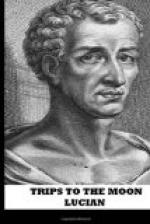Thus do these foolish fellows trifle with us, neither knowing what is fit to be done, nor if they did, able to execute it, at the same time determined to say anything that comes into their ridiculous heads; affecting to be grand and pompous, even in their titles: of “the Parthian victories so many books;” Parthias, says another, like Atthis; another more elegantly calls his book the Parthonicica of Demetrius.
I could mention many more of equal merit with these, but shall now proceed to make my promise good, and give some instructions how to write better. I have not produced these examples merely to laugh at and ridicule these noble histories; but with the view of real advantages, that he who avoids their errors, may himself learn to write well—if it be true, as the logicians assert, that of two opposites, between which there is no medium, the one being taken away, the other must remain. {49}
Somebody, perhaps, will tell me that the field is now cleansed and weeded, that the briars and brambles are cut up, the rubbish cleared off, and the rough path made smooth; that I ought therefore to build something myself, to show that I not only can pull down the structures of others, but am able to raise up and invent a work truly great and excellent, which nobody could find fault with, nor Momus himself turn into ridicule.
I say, therefore, that he who would write history well must be possessed of these two principal qualifications, a fine understanding and a good style: one is the gift of nature, and cannot be taught; the other may be acquired by frequent exercise, perpetual labour and an emulation of the ancients. To make men sensible and sagacious, who were not born so, is more than I pretend to; to create and new-model things in this manner would be a glorious thing indeed; but one might as easily make gold out of lead, silver out of tin, a Titornus out of a Conon, or a Milo out of a Leotrophides. {50}




